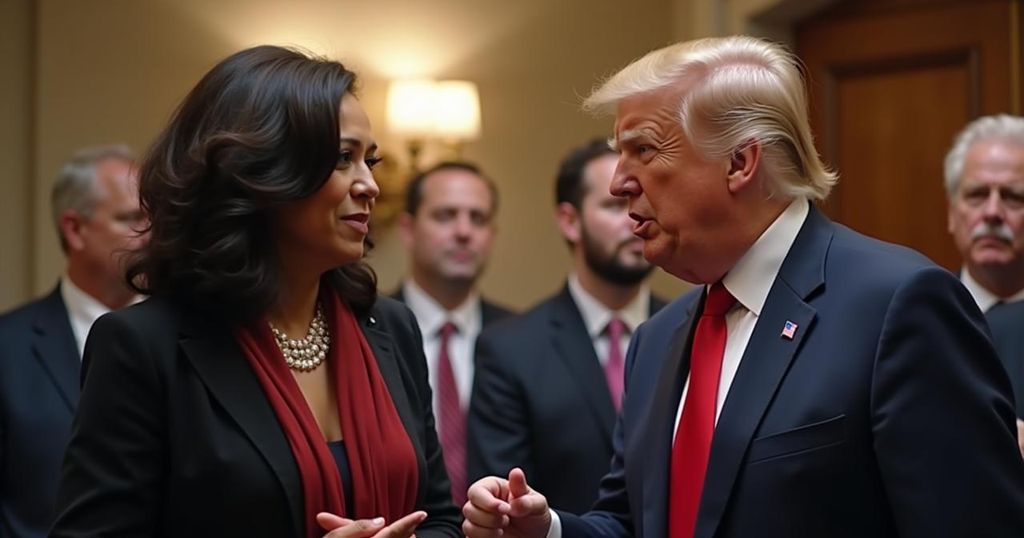On October 14, 2024, Vice President Kamala Harris and former President Donald Trump campaigned in Pennsylvania, highlighting key issues ahead of the presidential election. Harris criticized Trump’s rhetoric regarding internal enemies, while emphasizing early voting and health transparency. Trump sought to galvanize his base amid improving economic sentiments. Both candidates aimed to sway undecided voters in this crucial battleground state, with Harris’s rally in Erie and Trump’s town hall in Oaks illustrating their campaign strategies.
On Monday, October 14, 2024, Vice President Kamala Harris and former President Donald Trump engaged in a vigorous campaign across Pennsylvania, aiming to capture the crucial electoral votes of this battleground state. Harris addressed supporters in Erie, located in the northwestern part of Pennsylvania, while Trump held an event in the southeastern suburbs of Philadelphia. Notably, this campaign season marks Vice President Harris’s tenth visit to Pennsylvania, underscoring the state’s importance in the electoral landscape. Just last week, Trump made separate stops in Scranton and Reading, demonstrating his commitment to gaining support in the state. Harris intends to highlight Trump’s recent controversial comments suggesting the U.S. military could be called upon to deal with “the enemy from within,” a statement she views as emblematic of Trump’s divisive rhetoric. A senior official from her campaign emphasized that Harris would argue Trump perceives those who oppose him as adversaries, a notion she believes poses a threat to democratic values. In a Fox News interview, Trump articulated concerns about internal dissension, stating, “We have some very bad people. We have some sick people, radical left lunatics. And I think they’re the big — and it should be very easily handled by, if necessary, by National Guard, or if really necessary, by the military, because they can’t let that happen.” The candidates are likely to touch upon critical issues such as Pennsylvania’s energy sector and natural gas fracking to appeal to undecided voters. Amidst rising concerns regarding voter turnout, which is facilitated by mail-in voting in Pennsylvania, the political stakes are higher than ever. In the 2016 election, Trump narrowly defeated Hillary Clinton, while Joe Biden claimed victory over Trump in 2020 by a margin of approximately 80,000 votes. Harris’s rally in Erie is significant due to the city’s demographics; it is a Democratic stronghold bordered by Republican-leaning areas. She is also expected to address Trump’s limited transparency about his health and promote her early voting initiatives. Harris’s health has been presented positively, with a recent letter from her doctor affirming her excellent physical and mental health. In contrast, Trump, at 78 years old, would be the oldest president in U.S. history should he be elected again. In suburban Oaks, near Philadelphia, Trump plans to conduct a town hall meeting to energize his supporters. Enthusiasm for Trump appears heightened this election cycle, with local resident Tom Bonanno noting, “I’m feeling a shift because the economy affects everyone. It’s not just going to be on, you’re feeling joy or happiness or whatever they’re running on. It’s about the economy once again.” Pennsylvania, possessing the most electoral votes of any swing state at 19, has received significant attention from both campaigns, with a total of 46 stops recorded thus far. This intense focus reflects the strategic importance of Pennsylvania in the presidential race, reigniting debates surrounding its electoral tendencies since Trump’s emergence as the Republican nominee. Notably, while the Democratic Party has achieved dominance in recent gubernatorial elections, the state Legislature remains closely contested, highlighting the complexity of Pennsylvania’s political landscape.
Pennsylvania is a pivotal state in U.S. presidential elections, traditionally acting as a battleground due to its diverse electorate and significant electoral votes. With a historical flip in voter support between major parties in recent elections, candidates must vigorously campaign to earn the trust and votes of the populace. The Democratic and Republican parties have been increasingly focused on Pennsylvania, particularly in light of its status as a state that can swing elections. Voting mechanisms like early voting and mail-in ballots are critical in mobilizing support among undecided voters. The discourse around economic issues, healthcare, and national security continues to be central themes influencing voter sentiment in the state.
In summary, the campaigning efforts of Vice President Kamala Harris and former President Donald Trump in Pennsylvania on October 14, 2024, underscore the strategic significance of the state in the presidential race. The division in rhetoric, particularly surrounding Trump’s comments regarding internal threats, demonstrates a key theme in the ongoing debate. With healthcare, economic issues, and voter engagement at the forefront, both candidates are working ardently to win over the crucial undecided voters in this pivotal state. As Pennsylvania remains a key battleground, how these themes evolve may greatly impact the electoral outcome.
Original Source: apnews.com






